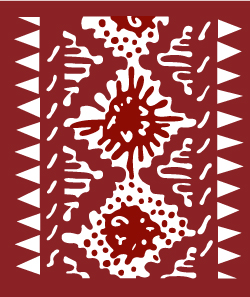In the ninth Chinese lunar month of every year many make the timeless journey to the quiet town of Ampang nestled not far from the river banks of the Klang River that in past centuries was a bustling tin mining town. At the preparatory stages of the Nine Emperor Gods festival the small town literally resurrects to its former glory of drawing masses and busyness. This is evident by the queuing traffic, buzzing motorcycles, explosion of colour, pop-up stalls and the lingering sound of acoustic music. It’s not hard to see that this is the biggest gathering for those of common belief.
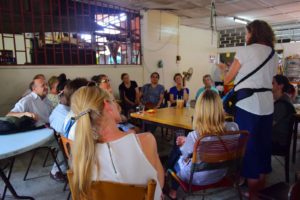
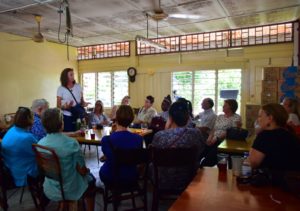
Members of the Malaysian Culture Group congregated at a cafe across from The Nine Emperor Gods Temple in anticipation to celebrate the 6th day of the namesake nine- day-long festival. In the cafe we exchanged pleasantries, enjoyed refreshments and of course got tutored about what awaits for the day by our guide Cheryl Hoffmann. The sound of gong and drums filled the air and the smell of burning joss sticks set the atmosphere for the presence of deities in the temple. This is one of the most important festivals in the Chinese Taoist calendar and only temples dedicated to these gods can celebrate this festival. In Chinese culture, number nine (9) is considered sacred and a lucky number, symbolising longevity. So the fact that the festival takes place on the 9th lunar month, for 9 days celebrating 9 Emperor Gods only affirms the importance of this festival to Taoist believers. However, there are variations to the story of the Nine Emperor Gods but this one is widely known: The Nine Emperor Gods are believed to have been the sons or disciples of the Jade Emperor, they ascended to the heavens and taken permanent residence as a cluster of stars known as The Big Dipper. The festival hence celebrates the spirits of The Nine Emperor Gods that descended upon the mediums putting them in a trance-like state.
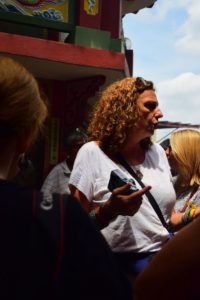
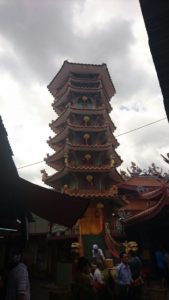
The sixth day of this strict vegetarian festival marks the day where the four celestial guards who protect the temple grounds are fed. The food is prepared in the morning and at the ceremony the mediums perform rituals to offer food to the guards. The rituals involve self-mutilation by the mediums, hitting themselves with implements as a sign to show that the spirits of the Nine Emperor Gods have possessed their bodies, hence they are not susceptible to pain. In the middle of the temple grounds the mediums perch themselves on a bench and one by one they display their devotion for the deity to the crowds.
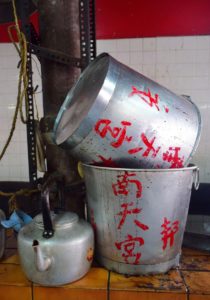
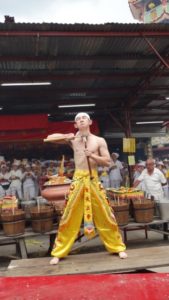
Attendees dressed in yellow and white in the festival are known as the devotees, you’ll notice them carrying joss sticks and in constant prayer. The temple also has dormitories that house the devotees for the duration of the festival at a nominal fee, their mandate is to follow a strict vegetarian diet and immerse themselves in prayers three times a day. The sight of devotees on the temple grounds gives off the sense of sheer dedication and religious fervour to the deity.
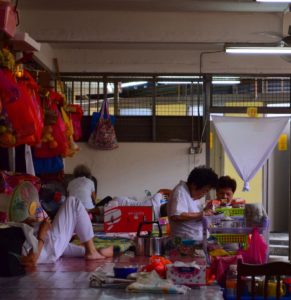
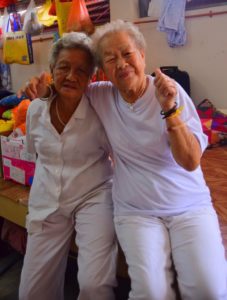
Within the main altar, many devotees and worshippers join the long queues to place their joss sticks in the urn of the deities they want to honour and pray to. The smoke is so thick and ephemeral whether to a first-timer or veteran to the main altar, the smoke stings the eyes alike. Moving further inside the inner sanctum of the main altar, more and more people continue to bring their food offerings and say prayers. There is a yellow curtain in the inner sanctum and behind it is where the spirit of the Nine Emperor Gods rests. Worshippers join the queue say prayers below their breath and when they get closer to the curtain they put their joss sticks in the urn and receive a cup of tea from behind the curtain, from the Emperor.
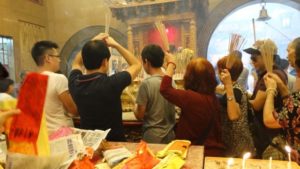
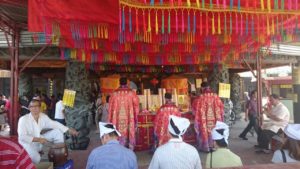
The festival not only draws thousands of pilgrims from neighbouring countries to the temple but also tourists and inquisitive people alike who want to experience this amazing event. By mid morning the temple grounds are packed with worshippers and of course shoppers. The pop-up marketplace within the temple grounds becomes a fixture for the duration of the festival and attendees are spoiled for choice in a variety of stalls. Those who are done with their daily prayers and rituals, make their way to the marketplace for a more relaxed setting. In the true sense of Yin Yang of balancing two extremes, after serious fervent prayers, intense devotion and rituals the crowds move over to a relaxed environment, the marketplace. In the marketplace pilgrims are treated to a variety of vegetarian food stalls and gift stalls. This gives attendees a chance to catch up with old friends and make new ones, with opera music in the background entertaining the gods. For many who come here this is a most spiritual experience that binds those of common faith together in prayer for nine days. At the end of the 9th day the spirits of the Nine Emperor Gods will ascend back to the stars and then the wait for next year’s festival to commence.
Text by Ursula Skomolo
Pictures by Caterina Meriggi, Michelle Pease and Elizabeth Dent
